Discovering Cardiff’s LGBTQ+ History through walking
Have you paused to consider the history of the streets you walk in every day? Our urban landscapes hide the untold history and legacy of the buildings and people that occupied them.
As part of our commitment to fostering inclusive communities, this summer Living Streets organised an LGBTQ+ history walk around Cardiff City Centre in collaboration with The Queer Emporium (TQE), a queer community and events space and shop.
The event was not just a walk but a celebration of queer history and a call for more inclusive urban spaces.
Living Streets Local Engagement Assistant, Emina Redzepovic went along to discover something new and queer about Cardiff.
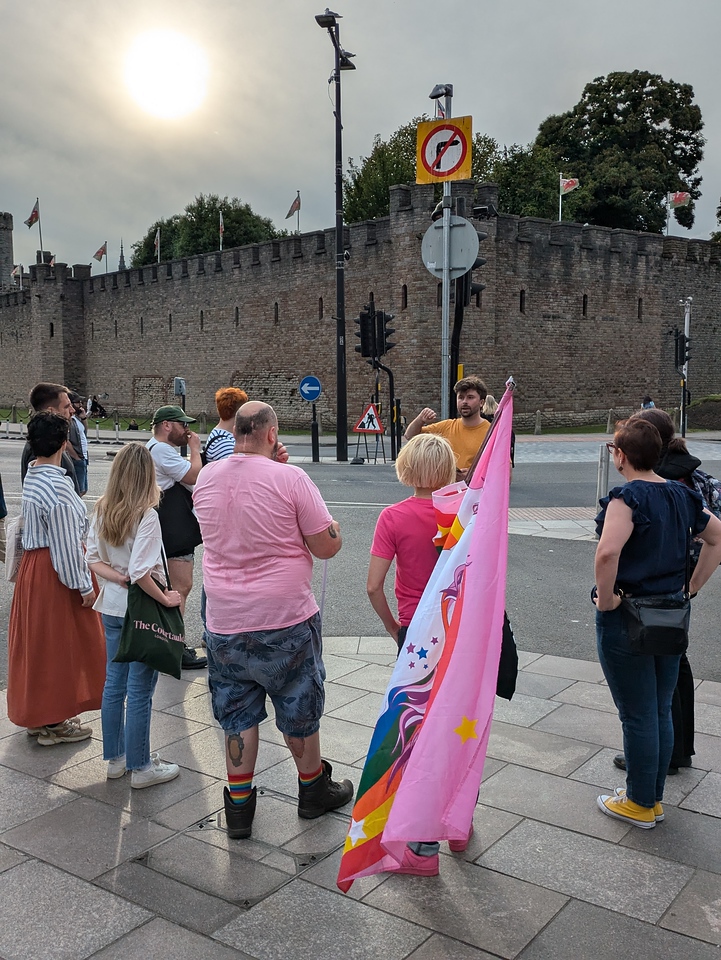
Yan talks to the group in-front of Cardiff Castle
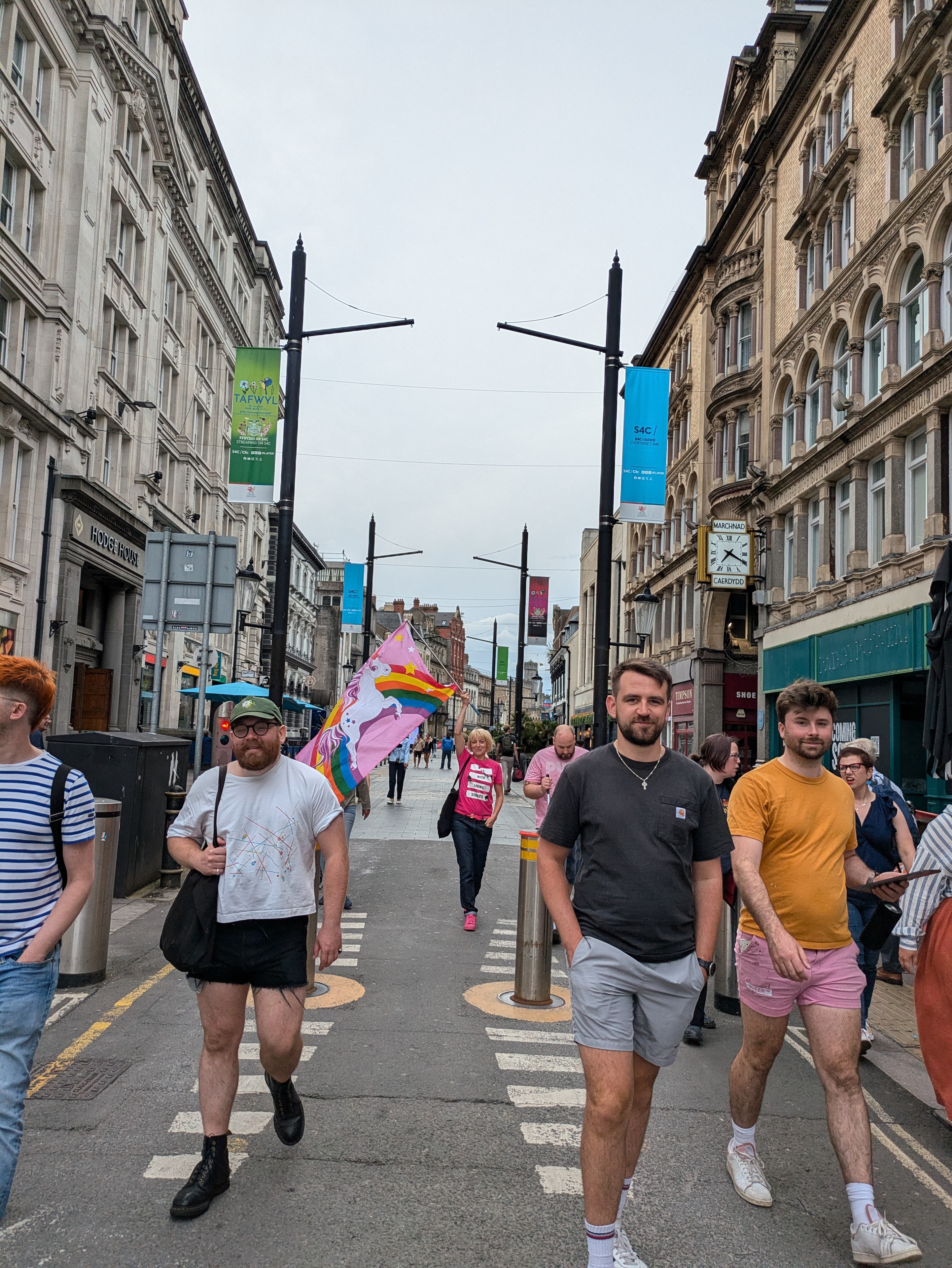
I’ve had the pleasure of stomping around Cardiff’s streets for ten years and was curious to see what more I could learn about my city on a balmy, sunny evening. The walk, led by Yan White, director and founder of TQE, offered a deep dive into Cardiff’s queer past. The Queer Emporium is located on St Mary’s Street, a pedestrianised area in the heart of Cardiff enjoyed by shoppers, the hungry and night-time revellers. The footfall was busy as food delivery cyclists whizzed past us, pubs began to fill up and commuters began the journey home to and from central train station.
As we walked together, we found out about the queer landscape, history and gossip of the past and present. We also heard about changes that have been made to the city centre that directly affect marginalised people. Our steps took us to Victorian gay hangouts, former gay saunas and queer-owned pubs to today’s queer clubs like Pulse and Kings. Yan’s storytelling illuminated the evolution of Cardiff’s queer scene and how it is firmly on the map to becoming one of the UK’s most welcoming places for the gay community.
Cardiff, like most major UK cities, is undergoing significant redevelopment. On the walk we were met with road and pavement works, clutter and rubbish, and vehicle dominance. This exploration revealed how the city’s landscape has evolved and highlighted areas where improvements are needed to make Cardiff more inclusive.
After the event we all enjoyed a well-deserved drink and discussed people’s thoughts on safety, wellbeing and belonging in the community. I wanted to know more about how Cardiff’s streets could be more welcoming and inclusive. Conversations revealed concerns around safety and accessibility, particularly at night. Poor lighting, uneven pavements and clutter were some of the major problems identified by our walkers.
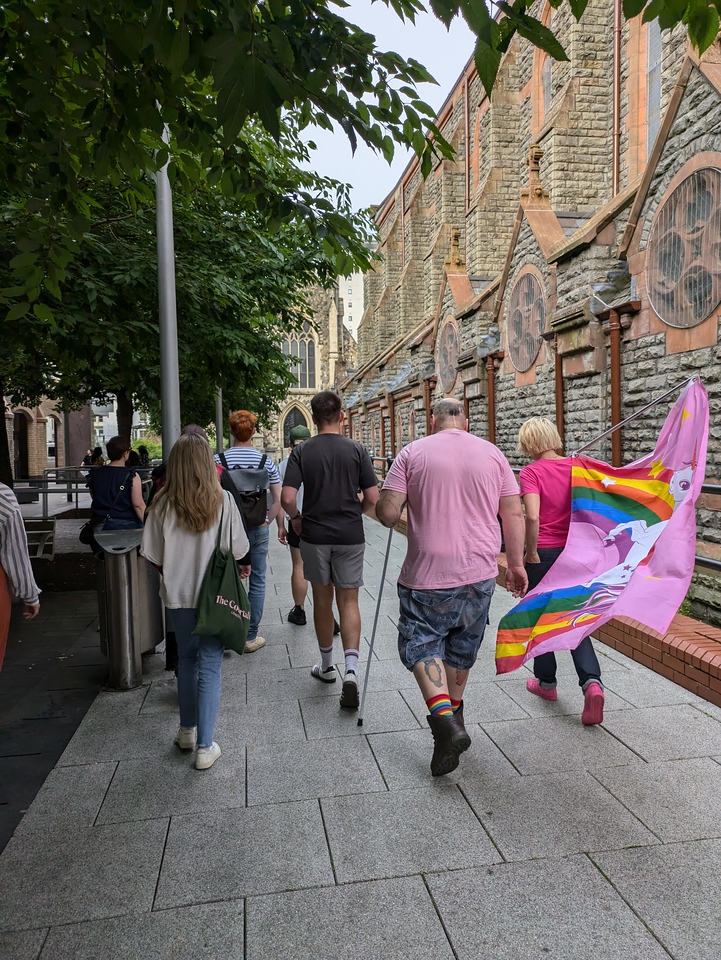
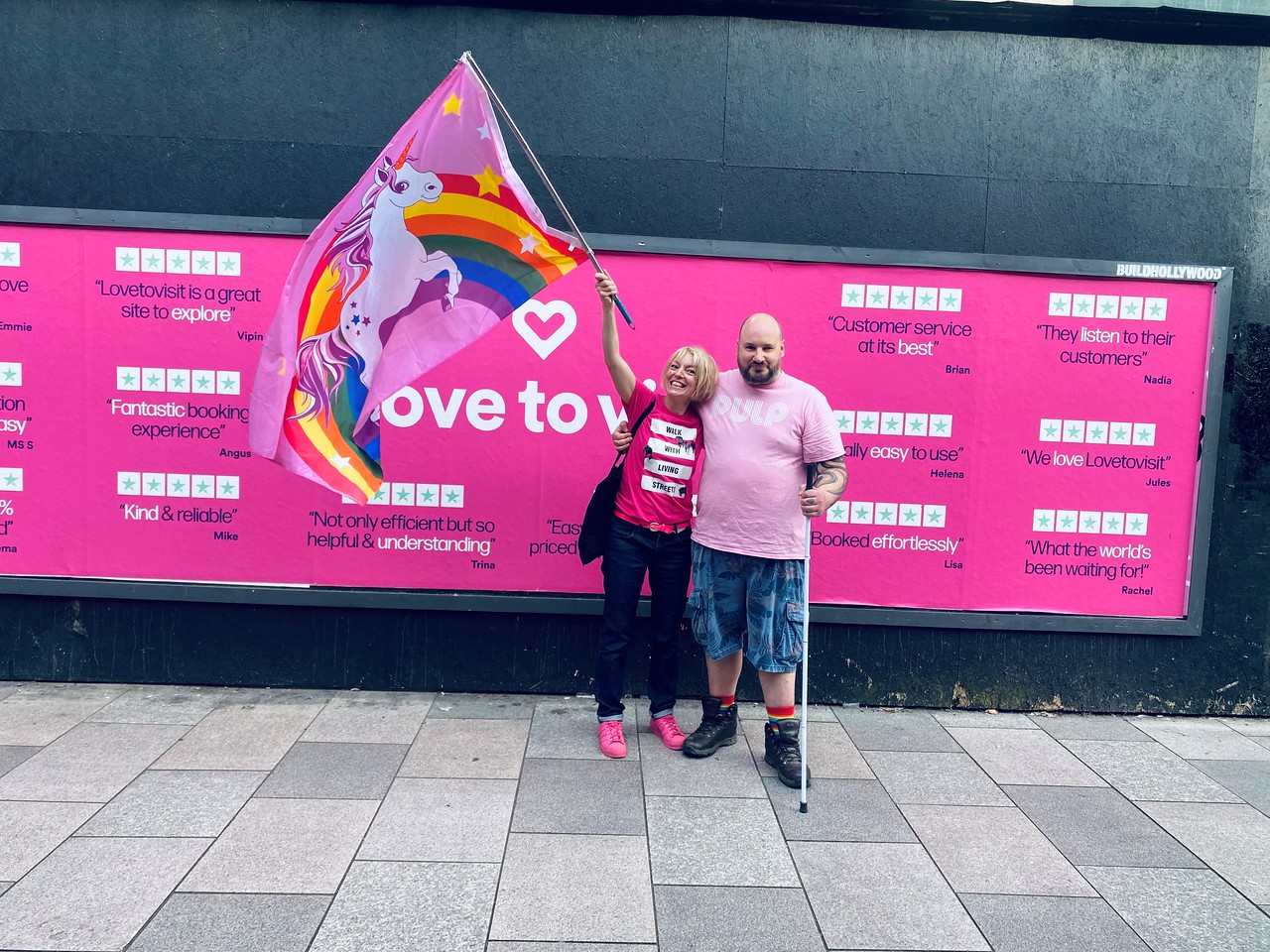
Aisha and Justin with with their unicorn flag
Justin said:
“I find walking around Cardiff as a queer person generally quite comfortable, my confidence is quite high. I only came out at 45 and after the medical things I have been through you realise how precious and short life is. I am visually impaired so when Cardiff is busier it can be harder to navigate. Late at night if there are large groups of people, mainly men, they are more willing to drunkenly try and insult people from the LGBTQ community”.
“One thing I think would improve Cardiff infrastructure for pedestrians is wider pavements as often they are too narrow for two people to walk alongside. From a safety perspective this is important as it can be safer to walk side by side than single file especially in areas where you don’t feel safe”.
Some of the comments around safety
“I feel safe as a Queer person in Cardiff 90% of the time, but I always feel alert”.
“Not all of Cardiff feels safe, especially at night. I don’t like being out past 10pm in certain areas”.
“Knowing there are queer owned businesses makes me feel safer.”
“I would like more sober venues and activities as an LGBTQ+ person in Cardiff. I’m glad The Queer Emporium exists”.
What would make Cardiff safer and more accessible for walking and wheeling?
“Smooth, even road surfaces”.
“Queer maps of the city”.
“Good Lighting”.
“Clear signposting paths around roadworks”.
“Less rubbish on the street.”
“Clear signage to transport and venues.”
Why LGBTQ+ Walks Matter
Understanding the hidden histories of marginalised communities enriches our connection to our surroundings and fosters a sense of belonging. By bringing to light the queer history embedded in Cardiff’s streets, we aim to create spaces where everyone feels seen and valued.
Marginalised groups often face barriers to feeling relaxed and at home in public spaces, whether due to safety concerns, microaggressions, or physical accessibility issues. Knowing that these spaces have historical significance for the LGBTQ+ community can help counter feelings of isolation and reinforce a sense of community. Thanks to the European Climate Fund for supporting our work in this area.
Living Streets and LGBTQ+ Walks
At our National Walking Summit Dr Kit Heyam led a 'walkshop' around Leeds, taking a group of 20 transport professionals along the soggy West Yorkshire streets, delving into the stories of the LGBTQ+ community and providing a new perspective on the city. We also support the local group Rainbow Walks Stoke who curate walks that aim to bring alive the rich LGBTQ+ history of the town.
Maurice Greenham from the Rainbow Walks Stoke group added:
“It is heartening to find Cardiff and Leeds doing similar Rainbow Walks to the one we did last year in Stoke. Cardiff and Leeds have approached and organised their walks so differently, but both are positive and inspiring.
These walks give an encouraging and stimulating review of the physical and mental wellbeing benefits of engaging LGBT+ communities in connecting through walking. For us, we find that talking with fellow walkers along the way and having time to sit down to reflect and share thoughts afterwards is also important in strengthening existing bonds and forging new friendships”.
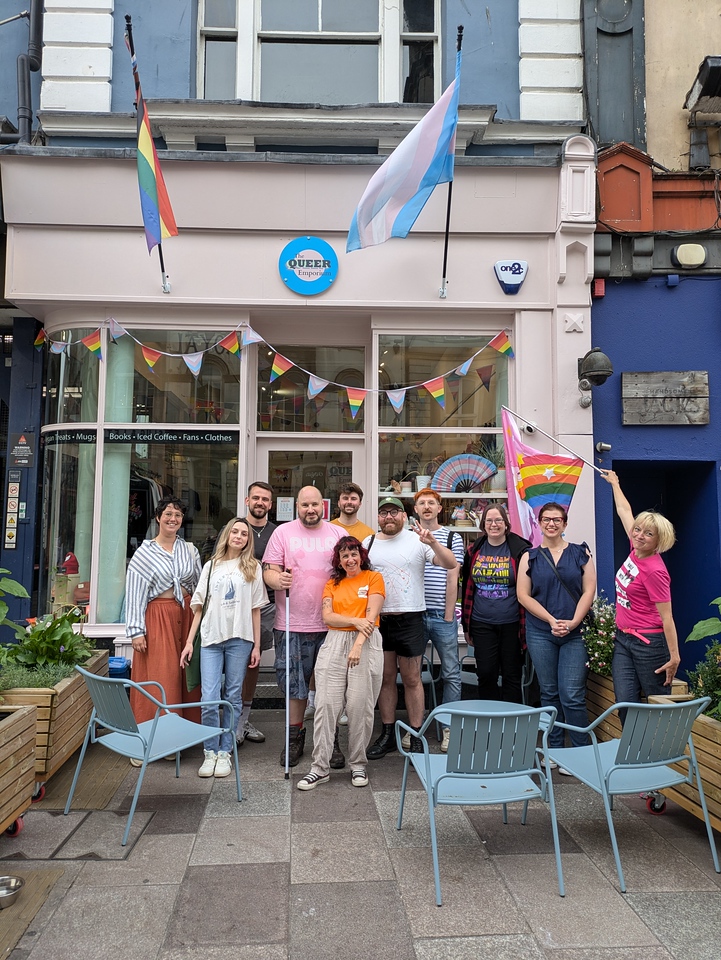
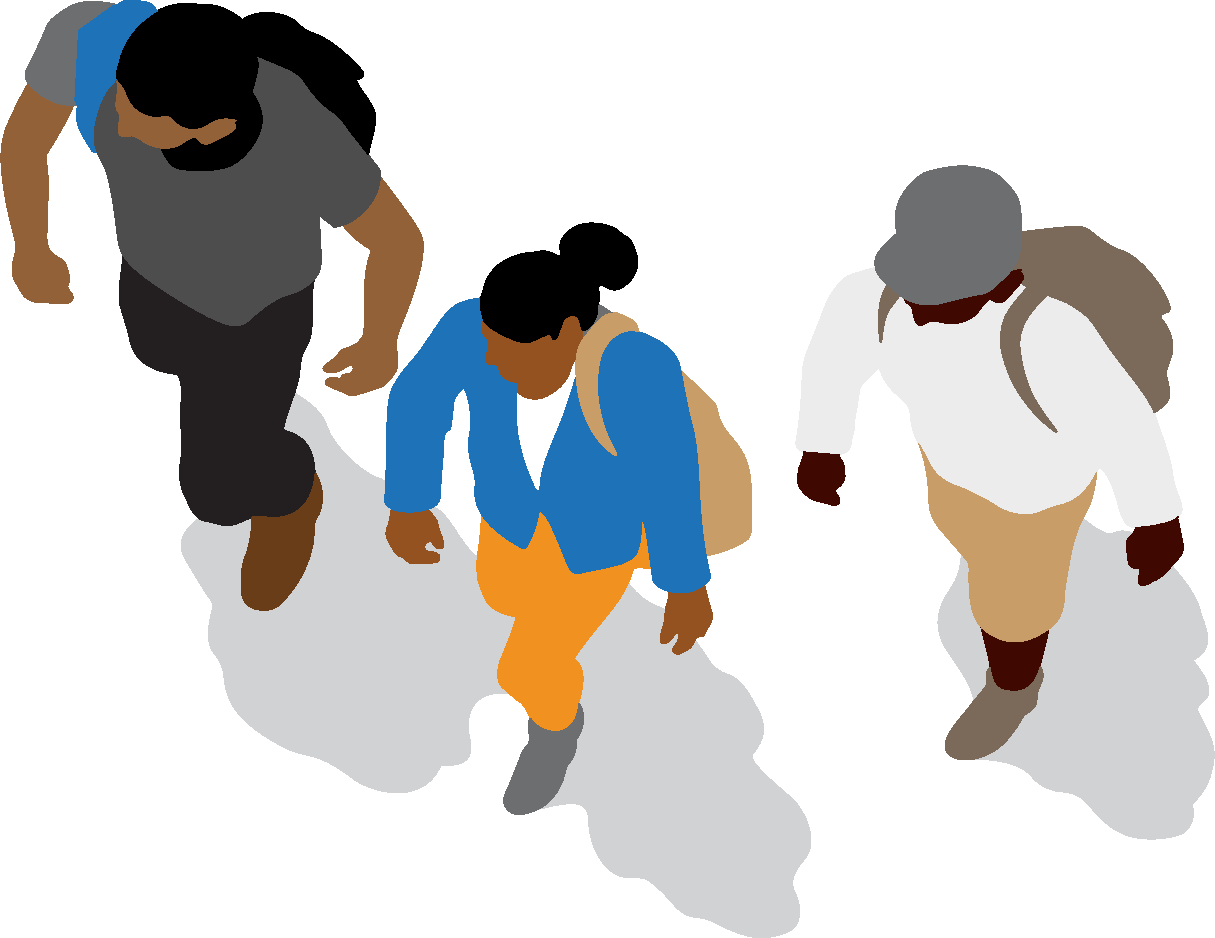
What next?
With continued funding and support from the European Climate Foundation we plan to do further LGBTQ+ history walks and incorporate the comments by attendees in a manifesto for change so that we can influence those with decision making power to make streets more accessible and safer.

